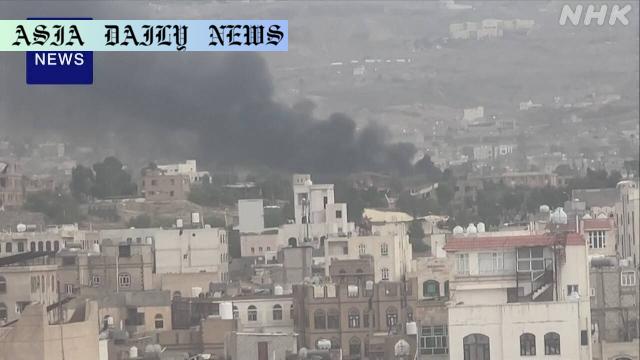Houthis vow to continue strikes on Israel, refusing to step back from Gaza support.
The Houthis plan to continue targeting Israel despite a ceasefire agreement between the US and Yemeni rebels.
President Donald Trump announced the cessation of US attacks on the Houthis following mediation by Oman.
Houthis remain committed to supporting Gaza, even escalating their missile strikes targeting Israeli-linked locations.

Background on the US-Houthi Ceasefire Agreement
The recent announcement of a ceasefire agreement between the United States and the Houthi rebels in Yemen has introduced a complex geopolitical dynamic. Facilitated by Oman, the agreement stipulated that neither side would attack the other moving forward. However, underlying tensions remain unresolved, as evidenced by the Houthis’ renewed commitment to targeting Israel. This development underscores the extent to which other regional conflicts, including the situation in Gaza, influence Yemen’s political actors and decision-making processes. President Donald Trump claimed the Houthis had “capitulated,” presenting this as a significant milestone in US foreign policy efforts in the region. Oman confirmed the ceasefire terms in a formal statement, emphasizing the mutual agreement to halt reciprocal hostilities. However, this diplomatic breakthrough has been overshadowed by the Houthis’ steadfast resolve to continue supporting the Palestinian cause, particularly through military actions against Israel.
Houthis’ Ongoing Strikes on Israeli Targets
Despite the ceasefire, the Houthis have maintained their missile campaigns targeting Israel-linked locations. A recent missile strike on a central Israeli airport, claimed by the Houthis, has heightened tensions. The Yemeni rebel faction has voiced their unwavering support for Gaza, describing their actions as both symbolic and strategic in countering Israel’s offensive tactics. A senior Houthi official reiterated their group’s dedication to supporting Palestine, framing their military operations as part of a larger struggle against what they see as Israeli aggression. Meanwhile, the Israeli military has also escalated its retaliatory strikes, including bombing the international airport in Yemen’s capital. These exchanges highlight the tangled web of alliances and enmities across the region, marking a significant chapter in the Houthis’ transition from a regional force to an internationally recognized militant actor.
Implications for Regional Stability
The continuity of Houthi strikes against Israeli-linked targets raises pressing concerns about the broader implications for Middle Eastern stability. While the ceasefire agreement signifies progress in resolving US-Houthi tensions, the group’s focused aggression towards Israel demonstrates their priorities lie elsewhere. By redirecting their military efforts towards supporting Gaza, the Houthis signal a prioritization of ideological and religious loyalties over international diplomacy. Given the already precarious conditions in Gaza following intensified Israeli offensives, which have reportedly resulted in more than 20 fatalities, the Houthis’ involvement could further complicate existing dialogues aimed at finding a lasting resolution for the Palestinian-Israeli conflict. Additionally, these actions invite a potential cascade of retaliatory measures from Israel, thereby amplifying the already volatile state of affairs across multiple fronts in the region.
Commentary
The Persistent Role of Ideological Commitments
The situation surrounding the Houthis’ continued aggression towards Israel, despite a formal ceasefire agreement with the United States, highlights the complexity of ideological commitments in shaping political and military agendas. Regional actors like the Houthis often defy conventional diplomatic outcomes, placing a higher value on symbolic actions that align with their ideological stance. In this case, the Houthis’ support for Gaza emerges as a critical factor overriding the potential benefits of a broader ceasefire, showcasing the convoluted nature of alliances in Middle Eastern geopolitics.
The Ripple Effects of Persistent Conflict
One must also consider the ripple effects this situation creates for ongoing regional conflicts. The Houthis’ unwavering stance serves as both a challenge and a warning for peace-seeking entities within and outside the Middle East. While Oman’s mediation efforts succeeded in halting immediate US-Houthi hostilities, their inability to address the ideological underpinnings of Houthi-Israel enmity reflects the limitations of such agreements. The Houthis’ actions risk escalating the broader Israeli-Arab conflicts, further complicating regional diplomacy.
Will a Diplomatic Breakthrough Ever Be Achieved?
Ultimately, the question arises whether such conflicts can be truly resolved without addressing the deeper ideological and socio-political motivations behind them. The Houthis demonstrate the enduring relevance of non-state actors in altering geopolitical landscapes, and their focused support for Gaza offers insight into the dynamics of resistance movements. However, their actions also underline key risks, including prolonged instability and humanitarian crises. Balancing ideological drives with diplomatic opportunities will remain a challenging tarefa for all international actors involved.


